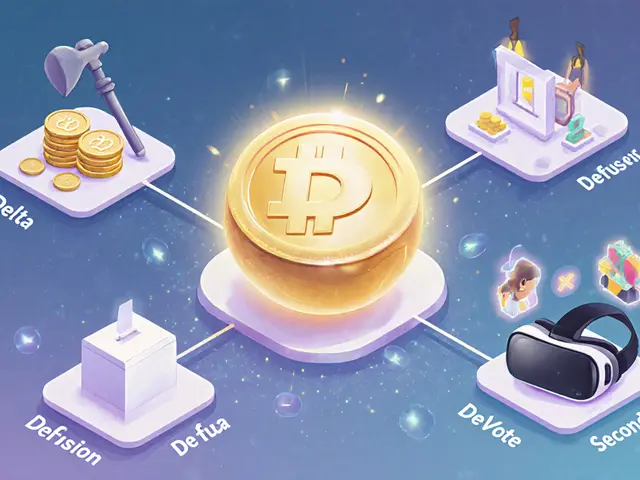Crypto Taxation in Nigeria: What You Need to Know in 2025

Nigeria Crypto Tax Calculator
Crypto Tax Calculator for Nigeria 2026
Calculate your capital gains tax based on Nigeria's new Tax Act 2025. Rates: 10% for individuals, 30% for corporations.
Tax Calculation Result
Note: Under Nigeria Tax Act 2025, capital gains tax is 10% for individuals and 30% for businesses. Ensure you keep detailed transaction records for compliance with FIRS.
Quick Summary / Key Takeaways
- Effective Jan12026, the Nigeria Tax Act2025 (NTA2025) taxes every crypto sale, trade, or income.
- Cryptocurrencies are classified as securities under the Investments and Securities Act2025, overseen by the SEC.
- Only licensed Virtual Asset Service Providers (VASPs) may offer banking services; Busha is the flagship local exchange.
- Capital Gains Tax (CGT) is applied at the same rate as other assets - 10% for individuals, 30% for corporations.
- Non‑compliance can lead to penalties up to 20% of unpaid tax plus possible criminal prosecution.
Ever wondered how the new Nigeria crypto tax regime will hit your wallet or business? The government just rolled out a full‑blown tax framework, and it’s not optional. Below we break down the legal blueprint, the steps you must take, and the pitfalls that could cost you dearly.
Nigeria is a West African nation with a rapidly growing digital economy. The country’s recent push to formalise crypto activity reflects its ambition to capture billions in untapped tax revenue.
Crypto taxation refers to the set of tax obligations that arise from buying, selling, trading, or earning cryptocurrencies. In Nigeria, this concept finally has a concrete legal home thanks to the NTA2025.
Legal Foundations: NTA2025 and the Securities Act
The cornerstone is the Nigeria Tax Act2025 (NTA2025) a law signed on 26June2025 and effective from 1January2026 that mandates tax on digital assets.. It builds on the 2023 Finance Act, which first named crypto a “chargeable asset”, but NTA2025 removes any doubt - crypto profits are taxable.
Simultaneously, the Investments and Securities Act2025 reclassifies digital tokens as securities, placing them under the jurisdiction of the Securities and Exchange Commission (SEC).. This dual‑track approach means you’ll deal with both tax and securities regulators.
Regulatory Bodies You’ll Deal With
Three agencies are now on your radar:
- Securities and Exchange Commission (SEC) the regulator that issues licences to Virtual Asset Service Providers (VASPs) under its Digital Assets Rules.
- Central Bank of Nigeria (CBN) the nation’s monetary authority that reversed its 2022 crypto ban in Dec2023, allowing banks to service licensed VASPs.
- Federal Inland Revenue Service (FIRS) the tax collection agency that will enforce NTA2025’s capital‑gains provisions.

What Triggers a Tax Event?
Under NTA2025, the following are taxable events:
- Sale of crypto for fiat (Naira or foreign currency).
- Swap of one crypto token for another (treated as a disposal of the first asset).
- Use of crypto to pay for goods, services, or salaries.
- Receipt of crypto as income, mining rewards, or staking yields.
Each event requires you to calculate the capital gain: proceeds - cost base - allowable expenses. The gains are then subject to the standard CGT rates - 10% for individuals, 30% for companies.
Compliance Checklist for Individuals
- Maintain a detailed ledger (date, amount, crypto type, fiat value, counter‑party).
- Report all disposals on the annual FIRS tax return using the newly added ScheduleC for digital assets.
- If you earn crypto as wages, your employer must withhold tax at the prevailing PAYE rate.
- Consider using a reputable tax‑software that integrates with local exchanges (e.g., Busha’s API).
Compliance Checklist for Businesses
- Obtain a VASP licence from the SEC. The application requires a business plan, AML/KYC policies, and proof of capital.
- Open a corporate bank account with a CBN‑approved bank (e.g., GTBank) - only possible after licence approval.
- Upgrade accounting software to capture crypto transactions in both fiat and token terms.
- File quarterly VAT (if applicable) and annual CGT on all crypto‑derived gains.
- Engage a tax adviser experienced in digital assets to avoid missed deductions.
Licensed Local Exchanges vs. Offshore Platforms
| Feature | Licensed Local Exchange (e.g., Busha) | Offshore Platform (e.g., Binance, KuCoin) |
|---|---|---|
| Regulatory oversight | SEC & CBN licensed, audited annually | No Nigerian regulator, subject to foreign jurisdiction |
| Bank integration | Direct Naira deposits/withdrawals via partner banks | Only crypto‑to‑crypto, fiat via third‑party services |
| Tax reporting assistance | Built‑in transaction statements for FIRS | Manual export, no local tax support |
| Penalty risk | Compliant users protected from enforcement | Higher risk of account freezing or seizure |
| Customer support (local language) | English & Hausa support desks | Primarily English, limited local outreach |

Enforcement Timeline and What Happens If You Slip
The government will start issuing digital filing mandates in January2026. Expect automated cross‑checks between the SEC’s VASP registry and the FIRS tax database. If you miss a filing, the penalty structure is:
- First offense: 5% of unpaid tax plus 30‑day notice.
- Second offense within 12months: 15% penalty plus interest.
- Third offense: up to 20% penalty, possible asset seizure, and criminal charges.
Because banks now must screen VASP licences, a non‑licensed exchange can’t move Naira in or out of the country, effectively cutting you off from the formal economy.
Professional Help: Who to Hire
Given the technicalities, you’ll want a tax adviser who understands both Nigerian tax law and blockchain accounting. Look for professionals with certifications from the Institute of Chartered Accountants of Nigeria (ICAN) plus demonstrable crypto project experience.
Future Outlook
With the NTA2025 aligning with OECD’s Base‑Erosion and Profit‑Shifting (BEPS) framework, Nigeria signals it will stay in step with global standards. Expect periodic updates to the Digital Assets Rules, especially around DeFi yields and NFT royalties. Staying compliant now will future‑proof your operations as the regime matures.
Frequently Asked Questions
When does crypto tax start in Nigeria?
The tax rules become effective on 1January2026. However, you should begin preparing records now to avoid a rushed filing season.
Do I need a VASP licence if I only hold crypto personally?
No. Personal investors don’t need a licence, but you must still report gains on your individual tax return.
How is a crypto‑to‑crypto swap taxed?
The swap is treated as a disposal of the first token. You calculate the gain based on its market value at the time of the swap, then apply the standard CGT rate.
Can I claim expenses for mining equipment?
Yes, mining costs-electricity, hardware depreciation, and maintenance-are allowable deductions before computing the capital gain.
What happens if I use an offshore exchange?
You can still trade, but you’ll face higher compliance risk. The CBN can block Naira transfers, and the FIRS may impose penalties if you cannot produce verifiable transaction records.







Wow, Nigeria finally decided to put crypto on the tax table. Guess the tax man got bored and thought, "Why not crypto?" The 10% rate for individuals feels like a sweet deal compared to some places. Still, keep those records tidy or you’ll be explaining yourself to FIRS later.
Ah, the ever‑exciting world of crypto taxation in Nigeria – nothing says "fun" quite like a 10 % capital gains levy for individuals and a whopping 30 % for corporations. First, let’s acknowledge that the new Tax Act 2025 finally brings some clarity to an industry that has been operating in the shadows for far too long. However, clarity does not equal simplicity; the calculator you’ve attached is a decent start, but the real work begins when you try to reconcile hundreds of trades across multiple exchanges.
1. Record‑keeping is now non‑negotiable. Every purchase, sale, and swap must be logged with the exact Naira value at the time of the transaction, including the associated gas fees. If you rely on screenshots or mental notes, you’ll find yourself at the mercy of auditors who love a good spreadsheet audit.
2. The distinction between “sale” and “trade” matters. While a sale triggers a straightforward capital gain calculation, a trade (e.g., swapping Bitcoin for Ethereum) is treated as a disposal of one asset and acquisition of another, each with its own cost basis. Misclassifying trades can lead to double‑counting or under‑reporting gains.
3. Don’t ignore crypto‑derived income. Staking rewards, airdrops, and mining proceeds are deemed ordinary income and taxed at your marginal rate, which can be higher than the flat 10 % CGT rate. The calculator’s “Income” option is a welcome inclusion, but you must still differentiate it on your tax return.
4. Corporate entities face a steep 30 % rate, which makes crypto a considerably riskier proposition for businesses unless they have strong profit margins. Many Nigerian startups are already re‑evaluating their token‑sale strategies in light of this.
5. FIRS now expects electronic filing of crypto transactions. The portal integration is still in beta, but expect a push for API‑based submissions soon. Early adopters who develop a robust internal tracking system will have a competitive advantage.
6. Lastly, consider the broader policy environment. While the tax sits at 10 % for individuals, future amendments could introduce progressive rates or exemptions for small‑scale traders. Stay tuned to any FIRS bulletins, as they tend to drop updates without much fanfare.
In summary, the Nigerian crypto tax framework is a mixed bag: it brings legitimacy but also imposes strict compliance obligations. Treat your crypto portfolio like any other investment – keep meticulous records, understand the distinction between capital gains and ordinary income, and don’t wait until the deadline to get your affairs in order. Good luck, and may your gains be as tax‑efficient as possible.
Honestly, if you think a 10 % tax is too much, just wait until you see how badly the government will enforce it. They’ll find a way to tax your coffee‑stained receipts too.
The 30 % corporate rate is a perfect illustration of why only the truly patriotic should own a crypto‑based business in Nigeria. If you’re not willing to sacrifice a huge chunk of your profit to the state, you shouldn’t be in the game at all.
One must admire the sheer audacity of the Nigerian tax authorities to think a simple percentage can tame the crypto beast. Yet, the moral high ground remains untouched, as they claim to protect the common citizen while imposing burdens that only the elite can afford. The lack of nuanced policy is glaring, and it betrays the very people it pretends to serve. In any case, the calculator is a nice toy, but it does little to address the underlying inequities. Hopefully, a more enlightened discourse will emerge soon.
Indeed, the tax landscape necessitates a philosophical reflection on fairness; one might argue that a proportional levy aligns with distributive justice, albeit the pragmatic hurdles remain significant.
Dear participants, it is imperative to recognize that compliance with the Tax Act 2025 requires diligent documentation of each transaction, including timestamps and valuation in Naira at the moment of execution. Failure to do so may result in substantive penalties imposed by the Federal Inland Revenue Service. Therefore, I respectfully advise all stakeholders to adopt systematic record‑keeping protocols and consider professional counsel where appropriate.
From a technical standpoint, the calculator’s UI could benefit from clearer labeling of “Sale” versus “Trade” categories; many users conflate the two and end up with inaccurate tax figures. Nonetheless, the effort to simplify tax calculations is commendable, and I encourage further refinement to address edge cases such as staking rewards.